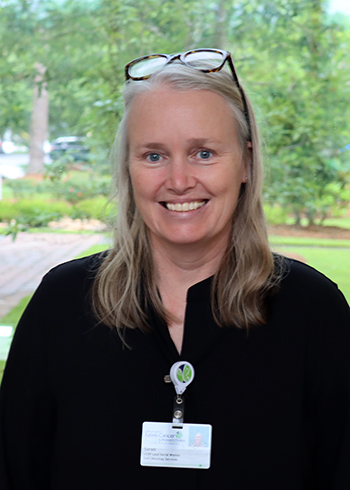Q&A: Understanding cancer survivorship
Cancer
Nancy N. and J.C. Lewis Cancer & Research Pavilion social worker explains this important aspect to your cancer treatment
From the moment of your cancer diagnosis, you are a cancer survivor. At the Nancy N. and J.C. Lewis Cancer & Research Pavilion, we support your survivorship in many ways that go beyond just having the latest technology and treatments. We also help survivors with the physical, emotional, social and financial aspects of having cancer.
Among the team that help you throughout your cancer journey, and beyond, are our social workers. Sarah Copeland is one of our social workers. She answers six questions you should know about cancer survivorship at the LCRP.

1. How would you describe cancer survivorship?
Cancer survivorship starts when the patient is diagnosed. Throughout your journey, we support cancer survivors in a variety of ways including physically, emotionally, socially and spiritually. Survivorship focuses on the health and well-being of cancer patients beyond diagnosis and treatment with everything from nutritional counseling to financial counseling to support groups. For example, we will be starting our cancer support group in July. It’s been on hiatus because of COVID-19, so we are excited to bring that back. (Details will be announced on our website and Facebook page.)
2. What are some other ways we help our survivors and their caregivers?
I would say the biggest thing is being there to support our patients’ needs, whatever they may be. Social workers, for example, are available to meet with patients and their caregivers during appointments or over the phone to discuss available resources and offer support.
Another example is our Cancer Transitions program. The program provides education and support to patients who have completed their treatment but may still have questions or need support. The sessions focus on four areas:
- Getting Back to Wellness: Take Control of Your Survivorship
- Emotional Health
- Eating Well and Staying Active
- Medical Management Beyond Cancer: What You Need to Know
Learn more about Cancer Transitions here.
3. In addition to having the best technology and treatments, as well as highly-qualified and caring co-workers, why is it important the LCRP focuses on survivorship?
The news of a cancer diagnosis can be overwhelming, and we want to be there to support you in other ways than just being treated for your disease. If you need help with transportation, we have people that can help. If you need help figuring out your insurance, we have people that can help. It’s our goal to treat your cancer, but also treat you as the person.
Something like the Cancer Transitions program is a perfect example because it fills that void of when a patient has completed all their treatment, but they still have some questions, and they still want to have that support. This class offers all that and education, which is really great for patients.
4. How is our commitment to helping patients through this survivorship journey an example of treating the whole person, not just their cancer diagnosis?
We have a comprehensive team that is here for our patients and caregivers. I think it’s important to emphasize there are different team members in our program in addition to our doctors and nurses, and by speaking with us, we can come up with some suggestions and resources that maybe the patient didn’t know they needed. It could be a question about diet and nausea or simply having someone to talk to on those more difficult days. We’re all here for you, including our social workers, dietitians and financial counselors.
5. What are some future plans to continue to support patients and families?
We recently collaborated with the Edel Caregiver Institute to create a new support group, which focuses on the caregivers of the cancer patient. The caregiver support groups are held at the LCRP on the second floor in the conference room on the fourth Tuesday of each month from 10 a.m. to 11 a.m.
In September, we also are partnering with the Edel Caregiver Institute to provide an educational class to caregivers.
We also hope to bring back our in-person Yoga for Cancer Patients class soon.
6. If a patient or caregiver does have a question or wants to get involved with any classes or support groups, how can they contact us?
Patients and caregivers interested in learning more about upcoming classes or support groups can contact me at 912-819-5167.
I would also encourage patients to visit our website to learn more about the programs and services we offer. We are starting to bring our groups back and we will make those announcements on the website and our Facebook page. Also on the website, we have a dedicated survivorship section with resources including videos on a variety of cancer topics, as well as numerous articles patients and caregivers may find helpful.